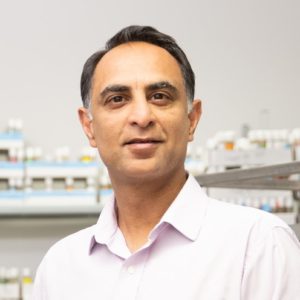by Buck Institute
July 27, 2022 . BLOG
The Obesity Society says we need to change the way we talk about obesity
Buck professor Pankaj Kapahi agrees
The Obesity Society, a professional organization focused on obesity science, treatment and prevention, has called upon researchers and clinicians to use less stigmatizing terminology in scientific journals and with patients who are obese. The goal is to bolster the understanding of obesity as a disease, rather than a personal weakness. Acknowledging that deeply ingrained perceptions within the medical community and the public perpetuate stigmatizing language, the society specifically focuses on the use of “morbid” as a non-scientific term often used to describe severe obesity as well as the word “fail” in regards to patient outcomes.
 Buck professor Pankaj Kapahi and his team study nutrient signaling and metabolism in the context of aging. Obesity is on their radar screen, given that it is a major risk factor for most age-related diseases. The lab’s focus on dietary restriction, which can increase lifespan in simple animals such as nematode worms and fruit flies and well as in mice, also factors into the lab’s interest in obesity.
Buck professor Pankaj Kapahi and his team study nutrient signaling and metabolism in the context of aging. Obesity is on their radar screen, given that it is a major risk factor for most age-related diseases. The lab’s focus on dietary restriction, which can increase lifespan in simple animals such as nematode worms and fruit flies and well as in mice, also factors into the lab’s interest in obesity.
Buck Senior Director of Communications Kris Rebillot talked to Kapahi about the call for a new way to talk about obesity.
Pankaj, I remember a public event a few years back where you said that we should not judge people who are overweight. That always stayed with me. Do you still agree?
Yes, I do. I look at it from a biologist’s point of view. If you look at any species, if you give them access to food, they are going to end up eating more than they need. This includes humans. We are hard wired to overeat. Evolutionarily speaking, it wasn’t that long ago when food was a scarce commodity. Survival depended on eating as much as possible when food was available.
First came the agricultural revolution and we became dependent on various types of grains. Moving ahead in time, the Industrial Revolution allowed the urge to overeat explode. Now we have machines that can mass produce food that’s high in calories, stripped of nutrients and relatively cheap to buy. We don’t need to spend a whole day making bread from scratch. We can buy it off the shelf, and in most cases the simple carbs are highly addictive. You know that saying, “It’s the best thing since sliced bread”? It is part of the lingo now, but I really think we should revisit it, because mass producing white bread is one of the worst things we’ve done for our long-term health and wellbeing.
And I’m sure that our modern society also contributes to the problem?
Yes, we get into a car instead of walking. We play video games instead of playing sports. We sit on the couch and watch TV, often with a bag of chips nearby. Labor saving devices like riding lawn mowers might be essential for some people, but overall we would be much better off pushing a mower around our yards.
We also have huge gaps in financial stability and access to healthy foods in this country. People who have to work multiple jobs don’t have time and can’t afford to seek out healthy foods. Often meals, if you can call them that, are built around what’s convenient and not expensive.
All of these thing together have created a dire situation. Two-thirds of the U.S. population is overweight, forty percent of us are clinically obese, which means having a Body Mass Index (BMI) of over 30. And despite all of our knowledge about diet and exercise, the experts expect that by 2030, nearly one in two adults will be obese and nearly one in four will be severely obese.
But you’re still not putting the onus on those who overeat?
Instead of blaming people, I think we should put the focus on the industries that make these unhealthy foods. There is no control over them. I don’t think people realize how Coca-Cola and McDonald’s have ruined society. Instead of holding these types of companies accountable we see them as symbols of success.
So we’ve got a situation where we are like the guinea pigs in this experiment – an experiment that makes it very easy to get addicted to unhealthy foods. Every day, you go to the supermarket and they are purposefully putting the best-selling products on the most accessible shelves. And guess what’s in most of the products? Usually it’s a combination of fat, carbohydrates and sugar that makes the food really tasty and addictive. It’s loaded with toxic advanced glycogen end products, called AGEs, which we study in our lab. Nobody is thinking of the consequences of these transactions. It’s an expression of the totally profit-driven world we are living in.
But I think people are going to realize sooner or later than these food manufacturers are just as bad as the cigarette companies, or maybe even worse, right? I just hope we get to that point sooner than later.
Let’s talk about your personal journey with food. Where did it start?
When I was 19 I read a report that said if you ate less you could live an extra decade. I said to myself, “I can’t believe that everybody doesn’t know and talk about this.” I was blown away. I’ve been working on caloric restriction since then.
But my thinking and understanding about food continues to evolve. And thinking and understanding pale in comparison to the effort needed to put good habits into practice.
When I was in my 20’s I did focus on eating less calories but I didn’t pay attention to the type of food I was eating. I would work late. I would get home at midnight and finish a tub of ice cream thinking I’d be okay because I had played basketball earlier in the day. My BMI was okay, I was lean – but guess what? I turned out to be pre-diabetic. That was a huge wake up call. I started paying attention to the both the types of food I was eating and the timing of when I ate it.
I met Satchidananda Panda who is an expert in circadian rhythms. I talked to him for almost two hours at an airport and I further changed my eating behaviors: no more eating after six pm, which set me on a path to do intermittent fasting. I also started eating more of a plant-based diet and I began to realize that eating different kinds of foods has a big influence. I stopped focusing on weight and shifted my attention to the foods I was eating. Turns out, when I eat more of a nut and plant-based diet, which is rich in legumes and vegetables, I don’t end up overeating.
So what’s going to lead us to a solution?
Well in addition to more funding for research into the biological connections between diet and health, I think there needs to be a real emphasis on health literacy and mindfulness. Studies show people don’t generally stick to diets. So we have to find ways to encourage better life-long habits. In general people are unaware of the impact of the choices they make when it comes to food and exercise. We really are not as aware both intellectually and in the moment when it comes to what, when and how we should eat. We eat out of habit, culture, and our addictions, and that’s why mindfulness is key.
And as far as motivation goes, there’s a huge meta-analysis out of Norway that estimates the impact of food choices on life expectancy for those who are 20, 60 and 80 years of age. I think it’s really exciting. Basically people who eat an optimized diet which includes large amounts of whole grains, legumes, fruits, vegetables and nuts can add years to their lives. People who make the dietary change at 20 can add about 12 years, starting at 60 can reap an extra eight years and those who start at 80 can add more than three years to their lives. That’s amazing. We should be talking about this!
Health literacy also needs to tackle the perception of what’s “cool” when it comes to diet. There’s this perception that eating carelessly is fun and that intentionally eating healthy foods is boring. I think its fine to eat a special treat now and then, but to make a habit out of overindulging in unhealthy foods is really sad. I really like food and one advantage of fasting is that food tastes better when you’re really hungry. And mindfulness can really help improve our relationship with food. One way to do that is to keep a food journal and write down your experiences with food. Studies show that 3-4 weeks of mindful attention to food for 15-20 minutes a day can help lose weight.
I understand that getting into the habit of eating well is not easy. Most of the Western diet revolves around eating bread and cheese. Pay attention to how many TV commercials are for pizza. Kids’ parties are all about pizza. We need to start early when it comes to teaching health literacy. I have two young daughters and I am making a real effort to expand their palates so they want to eat healthy foods. It’s not easy, but I really would prefer that they not get into bad habits that will harder to break when they are adults.
Here is the bottom line: There are supplements and there will be drug treatments that help people deal with being overweight. But there will never be a pill or elixir that allows people to eat whatever they want, whenever they want, and stay healthy. Whatever science comes up with, it will have to be part of a lifestyle that includes healthy food choices and an improvement in our relationship with food. It’s better to get started in that direction sooner than later.

SHARE